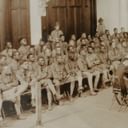
This week marks the 15th anniversary of the repeal of the death penalty in New Mexico. On March 18th, 2009, Governor Bill Richardson signed the repeal act (HB2085), ending the death penalty in the state. The bill came into force on July 1st, 2009. New Mexico followed New Jersey to become the second state in the 21st Century to end capital punishment through legislative means.
In honor of this anniversary and Women’s History Month, DPIC Data Fellow Łukasz Niparko interviewed two women who were at the forefront of this legislative and societal change in the Land of Enchantment, as New Mexico is called: Cathy Ansheles, the former Executive Director of the New Mexico Criminal Defense Lawyers Association and the first coordinator of the New Mexico Coalition to Repeal the Death Penalty, and Viki Harrison, current Director of the Constitutional Convention and Protecting Dissent Programs with Common Cause, who at the time of repeal served as the Executive Director of NM Repeal — leading the successful campaign to abolish capital punishment in New Mexico.
Following the U.S. Supreme Court ruling in Gregg v. Georgia (1976), New Mexico passed the Capital Felony Sentencing Act that reinstated capital punishment. Between July 1st, 1979, and December 31st, 2007, there were 211 death penalty cases filed in New Mexico with 15 people sentenced to death and only one execution. The one person executed, Terry Clark, had waived his appeals. Out of the remaining 14 death-sentenced prisoners, one died before his appeal was resolved, five had their sentences commuted by then-Governor Toney Anaya in 1986, five cases were overturned on direct appeal, and two were overturned after later appeals.
The repeal of capital punishment in New Mexico was not retroactive, leaving two persons on death row: Robert Ray Fry and Timothy Allen. Their sentences were later reduced to life in prison by the New Mexico Supreme Court on June 28, 2019. Back in 1975, New Mexico was a trailblazer when it excluded juveniles from death penalty eligibility, but it was the last among US states to adopt a sentence of life without parole, an alternative to the death penalty proven to reduce death sentences.
The advocates emphasized the importance of working with a broad coalition to pass the repeal bill. Ms. Ansheles said, “You need to match up and connect the storyteller with a person who is interested… in some cases, it might be a law enforcement officer. It might be the mother of somebody who’s been murdered, …an exonerated person, … or a religious person. But I think it is having all those stories, diverse stories, and storytellers on hand, so that you can match it up with the person that needs to hear it.” Ms. Harrison noted that repeal did not bring about any negative consequences in the state: “When I talk to people — most people did not even know we ever had the death penalty. I mean, it just literally left people’s minds. After repeal, we have not seen a surge in crime. We have not seen any negative effects.”
At the time of repeal, New Mexico was the 15th state to end the death penalty; today there are 23 states without the death penalty and six with a gubernatorial hold on executions. Learn more by visiting DPIC’s State by State info.
Below are lightly edited highlights of our conversations with Viki Harrison and Cathy Ansheles, also joined by Bill Stanton, a retired mitigation specialist and Cathy’s husband.
DPIC: Please tell us a bit about yourself and your involvement in the movement to repeal the death penalty in New Mexico.
Cathy: Prior to moving to New Mexico, I had worked in Alabama against the death penalty. I worked with people on death row and with their families; did community organizing and education about the issue and some work at the legislature in Montgomery as well. Later, while working at the Rothstein Donatelli law firm in Santa Fe on the Duran prison conditions case, I became connected with people who’d been fighting the death penalty in New Mexico for years, which eventually led to my becoming the Coalition’s first coordinator.
Viki: I have been doing nonprofit work for a few decades. And prior to becoming the Executive Director of NM Repeal back in 2008, I had worked in New Mexico for 15 years doing animal rights work. I literally saw an ad in the newspaper with a job opening for this. I looked into the death penalty, did some research, and thought, you know, this is the time, this is a state where we do not ever use it. The last time we executed somebody was because he gave up all his appeals. That is how I decided to join it.
Bill: I was converted to the position of opposing the death penalty also in Alabama, probably over the course of a couple of days in 1978, when I went to Montgomery and started working at the Southern Poverty Law Center. A friend just gave me some stuff to read and when I found out what the facts were about the death penalty, and that our legal representation was often so awful for people accused in death penalty cases — this mobilized me to act.
DPIC: Where were you on March 18th, 2009, when the announcement was made about the death penalty repeal in New Mexico?
Cathy: It was late in the evening on the last day that the Governor could sign the bill and I was at the State Capitol. I ran into Rep. Gail Chasey (our repeal bill sponsor) who said the Governor had just called her and Viki up to his office and we really did n0t know what his decision would be. Once the news started circulating, we were stunned and thrilled, walking around the Capitol hugging and grinning. And then we walked down from the Capitol to a local Santa Fe hotel bar and restaurant and began a spontaneous celebration that included many of the people who had testified over the years.
DPIC: What was the path that led to 2009?
Cathy: When Bill and I first moved to New Mexico, we asked around to see who was doing death penalty abolition work, because we had been involved in this when we were in Alabama. We volunteered with a group called the Committee to Stop Executions, and then formed the Coalition to Repeal the Death Penalty which became statewide. One of the very first people we contacted was Patrick Tyrrell, the Executive Director of the New Mexico Association of Social Workers. Other initial members of the Coalition’s initial steering committee included Ruth Hoffman, with Lutheran Governmental Ministries; Michelle Giger, a murder victim’s family member from Albuquerque a criminal justice professor at Highlands University [in Las Vegas, NM]; and some other social workers and members of the Catholic Church and other faith groups. A lot of time and work was put into making it a broad coalition that represented people from diverse organizations and perspectives. Bill helped coordinate the full-page ad campaign in our two major newspapers where people from various cities across the state signed on. That was quite significant in the early days — people seeing other people’s names, and it grew into a lot of old school grassroots organizing — going around to small towns and connecting with different folks at churches, civic groups, schools, community organizations, etc.
When we had our very first legislative interim committee hearing (around 1997 or 1998), we initially just requested a bill to simply study the death penalty. Rep. Chasey and another legislator said they preferred introducing a bill to abolish the death penalty straight away. And we were like, ‘whoa…’ From there, it was different tools that we had to use — we had to learn more about legislative strategy, and recruit more people who were familiar with the politics for making that sort of change happen. Fortunately, we had excellent people who could do this.
Bill: We recruited people from diverse walks of life and one of the most effective was a former New Mexico State police officer. We also had some former corrections employees who were involved, and we worked a lot with victims’ family members.
DPIC: What were the key arguments for and against the repeal of the death penalty? Were there any arguments that were unique to New Mexico?
Viki: We had been around for 12 years. We had victim family members who had been fighting with us. And so, I walked into a great coalition that was ready to do the work and had been doing the work. There had been a little bit of a split off — we were the last state to implement life without parole. [Governor] Bill Richardson was going to work for President Obama. Initially, Richardson had been supporting the death penalty. We met with every legislator, we did media, we talked to people all over the world. I mean, this was the second opportunity to legislatively abolish the death penalty in this country in the modern era [after New Jersey]. We had people in practically every country in the world that were interested and wanted to help. And then, in January [of 2009], Richardson got into some trouble and was no longer poised for the Commerce Secretary [job]. So, we had to go to plan B, which we were ready for!
We were able to change his mind with facts, data and hearts and minds. We all have power. Our power is our voice, our legislators, especially state and local legislators. We have a lot of access to them. Your senator and your representative are in your community. You can meet with them; you can talk to them. I will never forget when I was a college student and I went to a talk by one of my members of Congress, Senator Jeff Bingaman. This is back when we actually wrote letters. And I asked him, ‘Why would I write you a letter?’ And he said, ‘Every time I get a letter, I multiply it by 10,000. Because I know if one person takes the time to send me a letter — 10,000 people are thinking about it.’ That changed the course of how I look at advocacy: my voice times 10,000.
We made sure that the people Governor Richardson cared about reached out to him. When he was courting the film industry in New Mexico, we had film stars to call him and say, sign this bill. We had the religious communities on him constantly. I mean, the Archbishop Michael Sheehan was a huge ally of ours as was Bishop Ricardo Ramírez in Las Cruces. Rabbi Joseph R. Black in Albuquerque was outstanding. We were in the media constantly. We did polling that showed the majority of New Mexicans did not support the death penalty. They supported life without parole, they supported restitution to victims’ families. Then, our New Mexico Legislature introduced the bill sponsored by Representative Gail Chasey.
Cathy and Bill: The Catholic Church is very prominent in the state of New Mexico, which was really helpful. A lot of different Catholic leaders were very involved over the years leading up to repeal. It was also important to have the voices of victims’ family members and law enforcement. One of the major things that happened on the national scene that had an effect all over the country and in New Mexico was Illinois and their discoveries of people wrongly convicted on death row. New Mexico has its own stories of people who were wrongfully convicted, e.g., The Vagos Bikers, who were wrongfully accused of murdering 26-year-old college student Richard Velten. One of the things we did early on was to organize a panel at the law school with some of the key players who had been involved in the defense and the prosecution of The Bikers case. And that got media coverage, as well as a lot of people who attended and heard some first-hand accounts of how the system did not work. That was four people exonerated just in New Mexico during the mid 1970’s.
DPIC: How have victim families been considered or addressed in the debate around the death penalty and its repeal?
Viki: I think the biggest reason they support us is because they do not want someone else to be murdered, because they know what that family is going to go through. Also, the murder victim family members have to go through appeals [of a prisoner]. I think that that is why murder victim family members are important to this work — because they matter, their voices matter. You have to be incredibly ethical in the way you organize with murder victim family members, you do not use them, you do not tokenize them. You have to have space for them to decompress. It is hard to talk about this stuff. You have to protect them, and you have to support them.
DPIC: What is the long-lasting impact (if any) of repealing capital punishment on New Mexico, its people, and its criminal justice system?
Viki: Before Terry Clark asked to be executed, we had not used the death penalty in New Mexico for almost 50 years. When I talk to people — most people do not even know we ever had the death penalty. I mean, it just literally left people’s minds. After repeal, we have not seen a surge in crime. We have not seen any negative effects. And I think the positive effects are that people, at this point, just assume we have never had it. I do not think anybody misses it.
Bill: For people like us it makes us feel good to live in a state that is not consumed with this kind of demagoguery that often goes on around the death penalty. These 15 years have shown that society has not gone to hell. And people have not engaged in indiscriminate killing sprees because they knew they would not face the death penalty.
Cathy: I also think that there’s less hateful language in the media. There is less vengeance that is splashed on the front of a newspaper or on television. Every year when March 18th comes around, I feel like ‘yes, one more year under our belt’; ‘yes, this is going to become institutionalized’. And then, the Dobbs v. Jackson decision came down. And I realize there is not a magic number of years that will guarantee repeal will stay. So, while I am not quite as convinced as I used to be that each year makes it more permanent, I am hopeful that it is more permanent, and 15 years without a death penalty in New Mexico is definitely something to celebrate.
DPIC: What has been your further involvement with criminal justice system reform after 2009?
Cathy: The Coalition stayed involved, both at the legislature and at a grassroots level of working with families of murder victims in finding ways for them to get compensation and in helping to advocate for bills that served victims and family members. Personally, I am retired and have been for several years. And one of the things that I am passionate about doing is being on the board of the New Mexico Prison and Jail Project. We keep an eye on what is going on in jails and prisons, especially in terms of mental health and medical care and file lawsuits as a way to bring about change in those systems.
DPIC: What piece of advice would you give to people interested in advocating for criminal justice reform?
Cathy: I think one of the things that I learned is that there is not just one answer. For a state or a legislature or a community, you need to know a lot of stories and know people who can tell their stories, different stories. And then you need to match up and connect the storyteller with a person who is interested, or hopefully interested who needs persuading. In some cases, it might be a law enforcement officer, in other situations a decision-maker needs to hear from the mother of somebody who has been murdered, or an exoneree or a religious leader. I think it is critical having all those diverse stories and storytellers on hand, so that you can connect them with the policymaker or leader who needs to hear that particular story.
Viki: I tell people to get everyone involved. Ask everybody, get everyone involved, and redefine what a win is – sometimes it is just getting a committee hearing that year. You can be setting yourself up for lots of heartache because these issues are really heavy and folks’ lives are literally hanging in the balance. For us it took 12 years. It was not overnight. It also is a matter of conversations. You can talk to your friends and your cousins and your neighbors. Polling just a month ago shows that we do not listen to anybody but friends or family. That means we are super powerful. We are more powerful than legislators and our friends and family are listening to you more than anybody else.
How are we going to celebrate this 15th anniversary?
Viki: It is going to be more with friends and former allies. We did a big celebration for the 10th. And I told Gail Chasey, I would do it again for the 20th. So, for the 15th it is going to be lighting a candle remembering Governor Bill Richardson, who we unfortunately lost since our last celebration. We have lost too many important people in our coalition, and each anniversary, I like to honor and remember their important work to make New Mexico an abolition state.
Marcia J. Wilson, Spring 2008, “The Application of the Death Penalty in New Mexico, July 1979 through December 2007: An Empirical Analysis,” New Mexico Law Review.



